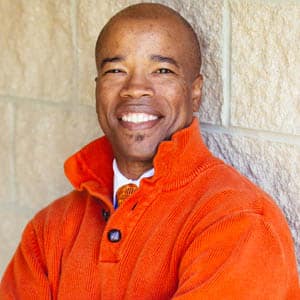
One of the most often-asked questions I’m asked by leaders is, “How can we improve the performance of our people—the individuals, teams and departments that make up our organization?”
The answer has a lot to do with “Uplifting Growth.” It’s one of the eight proven drivers of healthy workplace culture that make up what we, at BCWI, call the Flourish Model.
What exactly is Uplifting Growth, and how can it help change (and perhaps transform) the health of your workplace culture? And can a transformed culture increase the impact of your organization? That’s the story of Trinity Church in Lansing Michigan.
The Challenge
Lead Pastor Marvin Williams describes Trinity Church as “a non-denominational, intergenerational congregation of various ethnicities and socio-economic standards. We want to see people awakened to full life with Christ, as we bring others along on the journey, apprenticing the next generation.
"While Trinity was a good place to work, over the years we had somehow created a culture of fear, lack of trust, and poor communication. People made assumptions about one another that wasn't true. We were having meetings before the meetings and meetings after the meetings. We had the staff talking about one another but not talking to one another. You can’t win that way as a culture.
“If we were going to be a healthy organization, we had to do something about this. We saw the BCWI Staff Engagement Survey as a tool for us to ‘get under the iceberg’ of our toxic culture and make improvements.”
While the survey revealed the church had room to go improve the health of their culture, there was hope and promise in the area of Uplifting Growth, which means:
Improving the performance of individuals, groups and the organization
overall to meet the challenges in a changing world. Most significantly,
growth comes from job-related experience, along with interaction
with others, including managers, mentors, and coaches—as well as
from formal educational events. Learning new things increases
an employee's engagement and allows the organization to
maintain and improve its effectiveness.
So how did Uplifting Growth help transform the church’s culture whose level of employee engagement has increased five-fold from 13 percent four years ago, to 68 percent?
[shareable cite="Marvin Williams"]Your people are a gift from God. Therefore, love and care for them as you steward their growth.”[/shareable]
The Strategy
1) Dare to improve.
With humility, Marvin says, “My executive assistant, Brenda Dooley, came out of the marketplace into the church world. She surveyed the terrain and began asking an important question, ‘Why? Why are we doing it this way? Why aren’t our administrative assistants more collaborative? How can we make our systems better?’
“Brenda believed we could get better. She brought all of the administrative assistants together and today, by working together, they're planning ahead."
2) Be collaborative.
“Two Wednesdays a month we have an all-staff meeting. On the other two Wednesdays, we have what we call “squads.” Our staff is divided, across departments, into groups or squads of five to six people that are either reading a common book to improve their professional or spiritual life, or they’re working together to solve a problem. In this way, we push one another to get better and to grow deeper.”
3) Sit down at the table of trust.
“For us, sharing lunch together on the last Wednesday of each month is a sacred thing. As we eat together, we get to know each other better. We ask about each other’s families and share our lives, and in doing this we’ve grown to trust one another more.”
4) Practice direct, clear communication.
As the Trinity Church staff has discovered, Uplifting Growth is all about improving people’s professional, personal, and spiritual growth. “Prior to the BCWI survey,” notes Marvin, “we would not talk directly to the person with whom we had a conflict. We would talk to everybody else except the individual we were at odds with.
“That’s all changed. Today, if someone brings up an issue involving another person, the person who’s doing the listening first asks, ‘Have you had a conversation with the person you need to resolve the conflict?’
“Your first responsibility is to have the conversation with the person with whom you have the conflict. It’s all about developing emotional healthy engagement and conversation. You cannot have spiritual growth without emotional health. However, if I’m emotionally healthy and truthful with another person, it allows me to have freedom in my relationship with God.”
5) Steward the growth of your people.
“People want to grow. They want to be better at work; they want to be better followers of Jesus. Yet, sometimes people don’t have the tools, or the pathway, to get there. It’s our responsibility, as leaders to help them grow, and get better. Your people are a gift from God. Therefore, love and care for them as you steward their growth.”
The Results
What can Uplifting Growth look like in workplace culture? The staff and congregation of Trinity Church literally stepped into the answer for themselves on May 5. Instead of typically gathering for three worship services, the congregation met for abbreviated worship and then intentionally and prayerfully fanned out into the streets and neighborhoods of Lansing to love their neighbors.
“We called it ‘I Love My City,’ and it came about because our staff collaborated, dreamed, prayed and teamed across departments and gave people the tools and a pathway to love our city,” says Marvin. “Becoming more and more healthy, as a culture has increased our capacity to have a kingdom impact on our city.”
It's Your Turn
Which of the five action steps, above, causes you to think:
- “I like that, I want to know more.”
- “I can see a piece of that already happening here in our culture.”
- “That needs to happen now for us sooner than later.”
Coming Up Next on our Continuing Series
Uplifting Growth: Two Words That Can Radically Transform Your Culture
Rob McKenna, Founder/Master Coach
WiLD Leaders Inc., Seattle


 Al Lopus
Al Lopus
